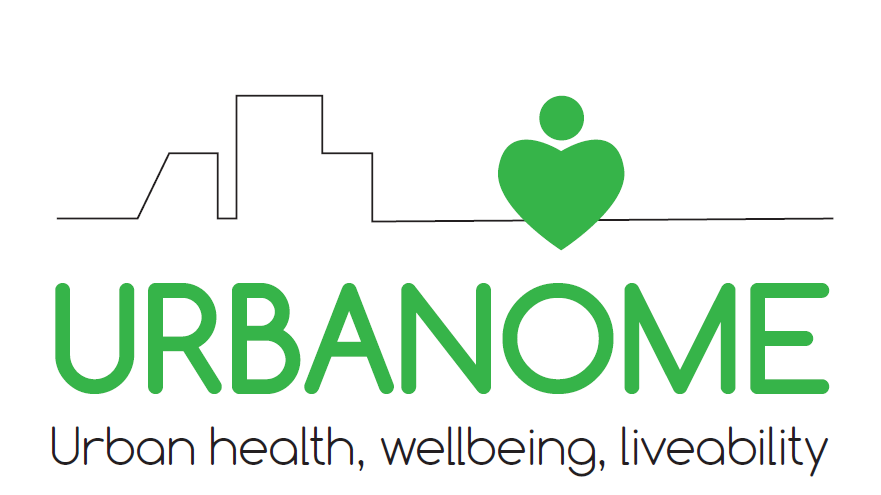Project Name: Urban Observatory for Multi-participatory Enhancement of Health and Wellbeing
Open Call Topic(s): Health
Description
URBANOME is a 4-year H2020 project focusing on research areas related to the climate and the environment and their interactions with health and well-being in urban settings aiming at building a common EU framework for evaluating comprehensively multi-sector policies in urban settings supporting the “Health in all Policies” approach of WHO. The overall objective of URBANOME is to promote urban health, well-being and liveability through systematically integrating health concerns in urban policies and the activities of urban citizens on the basis of detailed and comprehensive evidence on environmental health determinants, the spatial distribution of these in the city, and the social distribution of their impact among different population groups, accounting for different lifestyles and behaviours. Integration of health concerns, environmental stressors, and social equality in public and private activities help alleviate a wide range of contemporary urban challenges, specifically social cohesion and health inequality, and promote the transition of European cities to sustainable, climate-proof, smart and inclusive urban economies.
URBANOME brings together the complete set of environmental, social, and functional features of a city in an integrative analytical framework that would facilitate the identification of the main determinants of urban health and wellbeing and support the co-creation and testing of policies and precision interventions designed to improve urban health and wellbeing through Urban Living Labs.
The URBANOME approach will be applied through pilots built by the Urban Living Labs in Aarhus, Athens, Aberdeen, Madrid, Milan, Montpellier, Ljubljana, Stuttgart, and Thessaloniki tackling various levels of environmental exposures, age-dependent susceptibility windows, inter-individual variability, gender differentiation of exposure, and socio-economic disparities. These will allow us to draw conclusions regarding the determinants of urban health and well-being that will be translated into evidence-based policy recommendations considering socio-economic and environmental factors leading to urban health inequalities.
Reason for applying to HSbooster.eu services
We are applying for a Standardisation Booster service because we believe that standardisation will be highly beneficial to our research project to ensure the uptake and wider use of tools and methods we are going to develop in URBANOME while guaranteeing comparability, interoperability, and compatibility, providing quality and safety levels and codifying knowledge in clear and specific ways. In addition, participating in standardisation processes will help us to create tailored and impactful solutions and upgrade their reliability, accessibility, and quality of all the main exploitable outcomes of the project. URBANOME wants to create a real impact and, by identifying its standardisation potential, linking with relevant industrial and societal bodies, and distributing our results effectively to all relevant stakeholders, will significantly enhance the impact of our research. Moreover, participating in international standardisation processes will improve the possibility of enhancing the profile and reputation of scholars as well as of the university or institutes participating in the process.
Main Standardisation Interests
URBANOME is a 4-year H2020 project which has started in March 2021 and also consists of Work Packages and tasks that must be completed to ensure that runs smoothly. So, every task requires rules that define the scope, quality, and methods to be followed. The overall objectives related to the standardisation in different Work Packages are the following:
WP2 - Urban Living Labs for participatory planning and pilot interventions. The main objectives are to design planning processes that address major urban challenges locally while empowering citizens and promoting access to urban services and involve all relevant urban citizen groups, regardless of gender, race, religion, age, or social status. In this WP we will follow a quadrupole helix approach to co-design and co-monitor interventions related to individual lifestyles would include changes in the lifestyle aiming to result in a better quality of life, including health and well-being as well as interventions pertaining to technical and non-technical measures related to activity sectors involving sustainable mobility, urban planning, the built environment, and industry. The URBANOME Urban Living Lab activities will be developed in Aarhus, Aberdeen, Athens, Madrid, Milan, Montpellier, Ljubljana, Stuttgart, and Thessaloniki.
WP3 - Development of Big Data ecosystem. To better engage citizens and policymakers, the consortium will develop a web-based tool to estimate and visualise the environmental burden associated with both technical and non-technical interventions, as well as citizen changes in their personal lifestyles. The web-based tool will display environmental and socio-economic data analytics translated into appropriate indicators to citizen groups to quantify the extent of each exposure determinant, to be used as well as in innovative governance activities. WP3 will also develop a mobile app that will provide a tailored digital intervention for promoting outdoor activities and optimal physical well-being (increased activity & socialisation), mental health (alleviation of stress, anxiety, and depression), and improved cognition through a neuroplasticity-based training program.
WP4 - Exposure analysis focusing on patterns of socio-spatial environmental inequality: The main objective is to asses exposure to health stressors focusing on patterns of socio-spatial environmental inequality. To this end, we will collect data on individual exposure to air pollutants and noise by coupling wearable sensor data with questionnaires administered to different population groups, including vulnerable people and low socio-economic groups. Through a series of sensor campaigns carried out in the nine ULLs we will calibrate, validate and use the low-cost personal sensor devices to assess indoor and ambient air exposure and to provide ready-to-use models for exposure modelling on the personal and population level that accounts for different socio-economic factors.
WP5 - Assessment of physical and mental health and sleep quality: The main objective is to assess physical and mental health and sleep quality by using an objective, exhaustive evaluation framework. The research will be undertaken through a series of related activities, which deal both with the objective measurement of physical and mental health indicators and the close consideration of the connections between urban constructed environments and a sense of well-being. These activities will involve both quantitative and qualitative research techniques, all of which will be applied within the context of the ULLs. Citizens will be recruited to perform a uniform set of clinical examinations, focusing on the accurate assessment of cardiometabolic, respiratory, and mental health evaluation. We will also collect biological samples that will be analysed through a cross–omics platform to eventually provide prognostic markers regarding the effect of environmental stressors on NCDs. In doing that, we will make use of a novel methodological approach based on the exposome concept. The above array of methods and tools will allow us to identify risk factors of the urban setting related to NCDs and estimate the global impact of living in a city on individuals’ health by considering NCDs.
WP6 - Assessment of personalised interventions and proposed policies: The main objective is to apply an integrated risk assessment framework to evaluate the effectiveness of selected personalised interventions and the effectiveness of proposed policy options. The framework we will develop and apply will include the assessment of the economic impacts through Cost-Benefit and Cost-Effectiveness analysis of the interventions in the 9 ULLs allowing us to gather a comprehensive, integrated and quantitative view of the benefits and barriers of the proposed interventions, including the economic dimension.
WP7 - Innovative and co-creation governance: Targeted policy development and implementation. In this WP data and insights on governance cultures and structures in the ULLs will be collected and analysed using common systematic policy analysis frameworks and linking to the novel, co-creative, and experimental urban governance activities conducted in WP7 where results are contextualised and synthesized. In close collaboration with the city authorities in the ULLs, URBANOME will target and design governing processes, including participatory and innovative learning activities, that develop, implement and coordinate among targeted policies and among public and private actors, and enhance strategic ambitions and frameworks in the cities, building governance capacity to formulate and implement integrated and effective policies on sustainable transitions, air quality, health, and social equality and community cohesion in the city. The activities carried out in this WP will lead to drafting guidelines for policy-makers on how to integrate health, environment, and social inequality in urban governance.
WP8 - Evidence-based feedback to the policymakers. This WP has two main objectives: translate the project outcomes into precision prevention strategies and translate the project outcomes into evidence for policy making. To this end, the results of the ULL experience and the modelling exercises for the ULLs carried out, along with the outcomes of the WP4-WP6 will be used to examine the main scientific questions of the project. These relate to the interaction between environmental management in cities and the extent to which air quality (indoor/outdoor), noise, and climate affect public health (both physical and mental) and well-being. Answering these questions will support the optimal design and implementation of innovative preventive strategies to improve human health and well-being in European cities while addressing salient issues such as air quality, climate change adaptation, social cohesion, and equity. The activities carried out in this WP will eventually lead to drafting guidelines for policy-makers for precision prevention strategies and complemented by science-based policy recommendations and guidelines for policy-makers and urban planners on how to develop smart and green cities, including issues such as: How different policy options affect human health and social costs and how disproportionally they affect more vulnerable groups? How does city growth affect the urban environment at different spatial scales? What is the impact of large-scale dynamic processes on the urban environment? Which are the main barriers and drivers for the implementation of the proposed actions?
WP9 - Dissemination, communication, training, and exploitation. The main objectives are to organise an efficient transfer of the results of the project to the scientific community, stakeholders, and general audience and to set up focused dissemination and communication strategies aiming the public in the participating ULLs and countries. Another objective is to plan and verify the exploitation potential added value during and beyond the end of the project progress and to structure a Sustainability plan of the main output of the project towards wider adoption. One of the most important goals is to develop a business plan for the project's main tangible outcome and business models, including cost-benefit & cost-effectiveness analysis, for all project exploitable foreground and to prepare the ground for the commercial spin-offs.
Project Acronym: URBANOME

Grant Agreement Id: 945391
Start Date:
End Date:
Programme: H2020-EU.3.1. - SOCIETAL CHALLENGES - Health, demographic change and well-being
Call for proposal: H2020-SC1-BHC-2018-2020
Funding Scheme: RIA - Research and Innovation action



